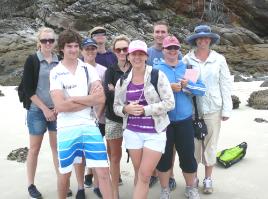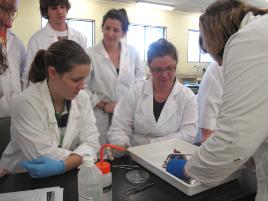Marine biology: Hard work- but someone has to do it
Published on 23 September, 2010
Ten final-year students from around Australia took part in a recent four-day residential school and field trip to Great Keppel Island as part of their third-year course Coastal Marine Resources.
According to course coordinator, Dr Bob Newby, this is a distinctive marine biology course in that as well as ecology it focuses on the sustainability and management issues of these important natural resources.

Students on their field trip to Great Keppel Island
"These are skills needed by future resource managers," Dr Newby said.
"This is a capstone course where students get an opportunity to think about the bigger picture and apply their knowledge to a range of ecosystems including coral reefs, mangrove estuaries, saltmarshes and near-shore fisheries.
"Practicals sessions include: use of computer simulations of complex systems, aging fish using otoliths (ear bones), examining zonation patterns in coral reefs, sampling and identification of marine plankton, as well as considering environmental determinants of plant succession and animal colonisation."
Course lecturer Dr Judith Wake said the working days are long and fitted around tides and weather.
"The practicals give the students experience in living and working in conditions that simulate those that would be found at a marine research station. Students gain valuable insights into the rewards and challenges of working in the field," Dr Wake said.
Students were also able to interact with researcher Associate Professor Larelle Fabbro to learn more about blue-green algae and Jessica Scannell, a fisheries research officer from the Centre for Environmental Management in Gladstone.


